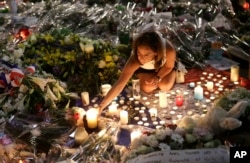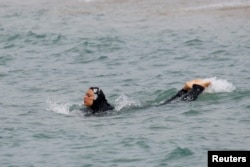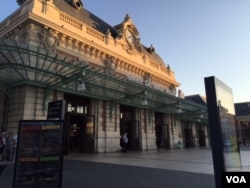A decision by France’s highest administrative court declaring the ban on burkinis illegal may stop more towns from prohibiting the full-body swimsuits, but does not end a heated battle between French secularists and the country’s Muslims, analysts said.
The three-judge State Council on Friday ruled the ban by the town of Villeneuve-Loubet “dealt a serious and clearly illegal blow to fundamental liberties such as freedom of movement, freedom of conscience, and personal liberty.”
The ban imposed by officials in Villeneuve-Loubet alleged that allowing the swimsuit posed a threat to public order, a claim the court said was not supported by evidence.
About 30 coastal towns have imposed the ban with the blessing of some high officials in the national government. Prime Minister Manuel Valls has said the swimsuit represents the “enslavement of women.”
France’s Minister of Women’s Affairs Laurence Rossignol has called the burkini “profoundly archaic.” In a recent interview with the French newspaper Le Parisien, Rossignol said, “the burkini is not some new line of swimwear. It is the beach version of the burqa and has the same logic: hide women's bodies in order to better control them."
Terror attacks stoke anger, suspicion
A string of terrorist attacks have raised anger, suspicion and aroused a need by many French to reaffirm the secular nature of their society.
French Muslims complain they are being made victims of collective punishment for terrorist attacks in which the majority were not involved.
President Francois Hollande said Thursday that life in France "supposes that everyone adheres to the rules and that there is neither provocation nor stigmatization.”
A court earlier upheld a ban on women’s head-to-toe swimsuits in the Riviera resort city of Nice, which is still mourning the deaths of 86 people after last month’s incident in which a truck plowed through hundreds of people who had gathered to watch Bastille Day fireworks. The truck was driven by a Tunisian immigrant and the Islamic State claimed responsibility.
The burkini issue has triggered debates on beaches across the south of France as the country’s vacation season winds down.
Reaction in France
At Nice’s main train station Friday, a Muslim woman wearing a headscarf, who identified herself only as Latifa, said she had chosen to avoid the beaches altogether.
“Integrating does not mean giving up my tradition and my faith," she told VOA. "I would just as well not go to a beach where people stare at me or the police will interfere with me.”
Reports this week said police in Nice fined an unidentified Muslim woman who was wearing a headscarf on the beach.
The anger unleashed over burkinis speaks of a battle between a strong religious tradition that mandates female modesty and a society that regards the secular state as sacred - one in which women have long felt free to sunbathe topless in beaches and other public places.
In a move reaffirming the separation of state and religion, France in 2010 enacted a ban on Islamic headscarves in some public spaces.
In Corsica, where tensions between members of the island’s Muslim community and native Corsicans have erupted into several incidents of violence over the past several months, police remained vigilant on the beaches.
“I am against burkinis, personally,” said Zerdalia Dahoun, a retired Paris psychiatrist who was among a group of North African activists meeting in Corsica’s main city, Ajaccio, this week to express their concern over tensions on the island.
“But I am also against the fact that someone would be prevented from dressing as they want in a public space,” Dahoun, originally from Algeria, said.
“Even though I am personally against the burkini because when one goes to the beach where people are naked, one does not go dressed in a way that will cause one to be noticed. Either you dress accordingly, or you don’t go at all. It’s a provocation to go to a place where people are not dressed and to show up with your clothes on,” Dahoun added.
Debate is not over
Friday’s ruling may give pause to other towns whose leaders are thinking of imposing the ban, but analysts say public sentiment on the issue will mean the debate is not over. Polls show more than 60 percent of French citizens surveyed are in favor of the bans while a large percentage is indifferent.
Those figures are likely to favor Marine Le Pen’s right-wing, anti-immigration National Front movement in next year’s national elections.
Francis Nadizi, the head of the National Front in Corsica, said his opposition to the burkini comes from a desire to see Muslims integrated, not isolated from French society. “It starts, with the clothing,” he said, but wearing Islamic clothing in public, he said, is meant to mark a difference between them and the rest of society.”
Zerdalia Dahoun is not undecided on the issue, but she – like many French – is conflicted.
“I know in the United States the Burka is permitted, that it doesn’t matter, but here in France it’s not like that. We have another system of integration. It’s not the same. If you’re in a public space, you dress so you don’t call attention,” Dahoun said.








